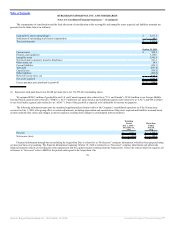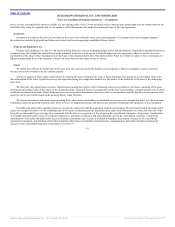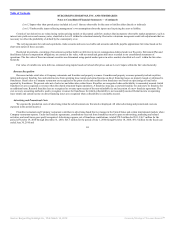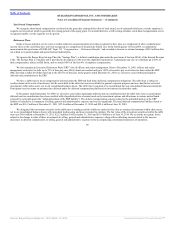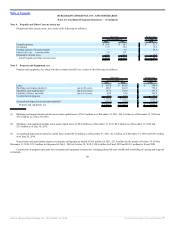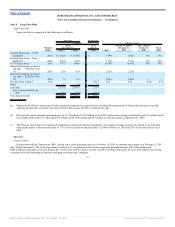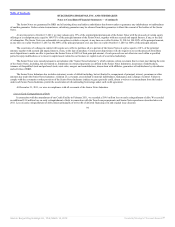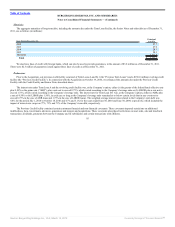Burger King 2011 Annual Report Download - page 87
Download and view the complete annual report
Please find page 87 of the 2011 Burger King annual report below. You can navigate through the pages in the report by either clicking on the pages listed below, or by using the keyword search tool below to find specific information within the annual report.
Table of Contents
BURGER KING HOLDINGS, INC. AND SUBSIDIARIES
Notes to Consolidated Financial Statements — (Continued)
Stock-based Compensation
We recognize share-based compensation cost based on the grant date estimated fair value of each award, net of estimated forfeitures, over the employee’s
requisite service period, which is generally the vesting period of the equity grant. For awards that have a cliff-vesting schedule, stock-based compensation cost is
recognized ratably over the requisite service period.
Retirement Plans
Gains or losses and prior service costs or credits related to our pension plans are being recognized as they arise as a component of other comprehensive
income (loss) to the extent they have not been recognized as a component of net periodic benefit cost. In the fourth quarter of fiscal 2009, we adopted the
measurement date provisions of FASB ASC Topic 715 “Compensation — Retirement Benefits” and recorded a decrease to retained earnings of $0.4 million after
tax related to its pension plans and postretirement medical plan.
We sponsor the Burger King Savings Plan (the “Savings Plan”), a defined contribution plan under the provisions of Section 401(k) of the Internal Revenue
Code. The Savings Plan is voluntary and is provided to all employees who meet the eligibility requirements. A participant can elect to contribute up to 50% of
their compensation, subject to IRS limits, and we match 100% of the first 6% of employee compensation.
We also maintain an Executive Retirement Plan (“ERP”) for all officers and senior management. Prior to December 31, 2010, officers and senior
management could elect to defer up to 75% of base pay once 401(k) limits are reached and up to 100% of incentive pay on a before-tax basis under the ERP.
BKC provided a dollar-for-dollar match up to the first 6% of base pay. In the quarter ended December 31, 2010, we elected to cease further participation
deferrals and contributions to the ERP.
We have a rabbi trust to invest compensation deferred under the ERP and fund future deferred compensation obligations. The rabbi trust is subject to
creditor claims in the event of insolvency, but the assets held in the rabbi trust are not available for general corporate purposes and are classified as restricted
investments within other assets, net in our consolidated balance sheets. The rabbi trust is required to be consolidated into our consolidated financial statements.
Participants receive returns on amounts they deferred under the deferred compensation plan based on investment elections they make.
In the quarter ended September 30, 2009, we elected to cease future participant deferrals and our contributions into the rabbi trust; however, participant
deferrals and our contributions have been credited with a hypothetical rate of return based on the investment options and allocations in various mutual funds
selected by each participant (the “unfunded portion of the ERP liability”). The deferred compensation expense related to the unfunded portion of the ERP
liability is included as a component of selling, general and administrative expenses and was not significant. The total deferred compensation liability related to
the ERP was $16.2 million at December 31, 2011, $27.0 million at December 31, 2010 and $22.6 million at June 30, 2010.
We designated the investment securities in the rabbi trust as trading securities which are carried at fair value as restricted investments within other assets,
net in our consolidated balance sheets, with unrealized trading gains and losses recorded in earnings. The fair value of the investment securities held in the rabbi
trust was $10.8 million at December 31, 2011, $22.2 million as of December 31, 2010 and $19.9 million as of June 30, 2010. We record the net (gains) losses
related to the change in value of these investments in selling, general and administrative expenses, along with an offsetting amount related to the increase
(decrease) in deferred compensation, in selling, general and administrative expenses in the accompanying consolidated statements of operations.
86
Source: Burger King Holdings Inc, 10-K, March 14, 2012 Powered by Morningstar® Document Research℠




